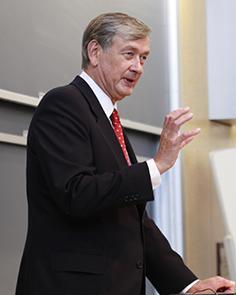The Future of the United Nations
Danilo Türk, Former President of Slovenia and Veteran U.N. Diplomat, Discusses the Prospects for Multilateral Cooperation as Part of the Center on Global Governance's Fall Speaker Series at Columbia Law School
New York, September 30, 2013—The United Nations has made great strides in promoting security, development, and human rights in recent decades and is poised to take on even more ambitious initiatives, said Danilo Türk, former president of Slovenia and long-time U.N. diplomat, in a Sept. 19 presentation at Columbia Law School.
| Former Slovenian president Danilo Türk |
Türk, whose distinguished tenure at the U.N. included five years as Assistant Secretary-General for Political Affairs and two terms as president of the Security Council, compared today’s U.N. to an 1805 memorandum by the British politician William Pitt the Younger that helped pioneer collective security agreements between nations.
“One can think about the future only when thinking properly about the past,” said Türk, who addressed students and faculty as a guest of the Law School’s Center on Global Governance. “After two centuries, multilateralism is no longer optional, but essential.”
Türk described how the U.N.’s first several decades were shaped by the Cold War, and how the collapse of the U.S.S.R. presented challenges and opportunities for diplomats.
“My hypothesis is that, after the end of the Cold War, the international scene has become more complicated,” Türk said. “The end of the Cold War created great expectations for diplomacy that did not fully materialize, as many resolutions were not followed by real actions.”
In recent years, the U.N. has been working on developing best practices for balancing diplomacy with force, Türk explained, including empowering a brigade of peacekeepers in the Congo with tools and authorization to execute targeted offensives that go beyond self-defense to tactically support peace and order.
The U.N. also has been honing its ability to conceptualize and measure development, implementing indicators that allow for better assessment and comparison of projects, which in turn have spurred more ambitious goals, such as eliminating extreme poverty by 2030.
Türk said that some of the most impressive progress has come in the rise of human rights awareness around the world, far beyond what he saw working in the field during the 1980s. The advance of human rights, he suggested, is a hopeful sign for the future.
Michael Doyle, the Harold Brown Professor of International Affairs, Law, and Political Science and co-chair of the Center on Global Governance, introduced Türk. The presentation was part of the center’s fall speaker series.
